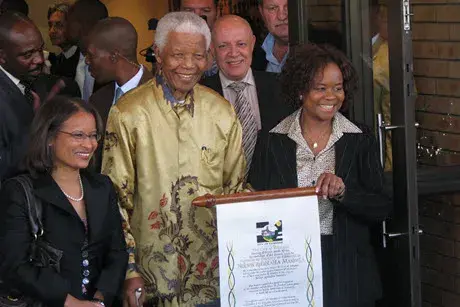Summer Holidays: International Mandela Day

International Mandela Day is celebrated on July 18 each year. Volunteering and community services on this day honor the legacy of Nelson Mandela.
In April 2009, the Nelson Mandela Foundation and the 46664 Initiative (the Nelson Mandela Foundation’s HIV/AIDS global awareness & prevention campaign) invited the world to join them in support of an official Mandela Day. The groups celebrated the day on July 18, 2009, with art exhibits, educational, fundraising, and volunteer events leading up to a concert at Radio City Music Hall. In November 2009, the United Nations declared July 18 Nelson Mandela Day with Resolution A/RES/64/13. The day was first officially celebrated by the United Nations in 2010.
Nelson Rolihlahla Mandela was born July 18, 1918, in Mvezo, South Africa. Mandela is known for successfully leading the resistance to South Africa’s policy of apartheid as a member of the African National Congress political party. Apartheid was the country’s system of institutionalized racial segregation. The National Party began enforcing racial segregation policies when they gained power in 1948. Because of his anti-apartheid activism Mandela became a frequent target for authorities. He was banned (restricted from travel, associations, and speech) and arrested on various charges. Mandela was put on trial with 9 others on charges of sabotage in the famous Rivonia Trial. The trial ended on June 12, 1964, with eight of the defendants convicted and sentenced to life imprisonment, including Mandela.
During his 27 years I prison, Nelson Mandela remained a symbol of the anti-apartheid movement. In 1989, F. W. de Klerk became South Africa’s President. De Klerk sped up the reform process his predecessor began. He initiated talks with the country’s four designated racial groups and moved to release political prisoners, including Nelson Mandela. On February 11, 1990, Nelson Mandela was released from prison.
Mandela was chosen as deputy president of the ANC (African National Congress) soon after his release and became the ANC president in July 1991. Mandela led the ANC in negotiations with de Klerk and the National Party in transitioning from apartheid to multiracial democracy. Nelson Mandela and F.W. de Klerk jointly won the Nobel Peace Prize for their work in 1993.
In April 1994, the ANC won the electoral majority in South Africa’s first free elections. Mandela was sworn in as South Africa’s President on May 10. President Mandela introduced housing, education, and economic initiatives designed to improve the living standards of the country’s Black population. He helped establish the Truth and Reconciliation Commission to investigate human rights violations under apartheid. He also oversaw the enactment of South Africa’s new democratic constitution.
Mandela retired from politics in 1999 but remained an advocate for peace and social justice until his death in 2013.


